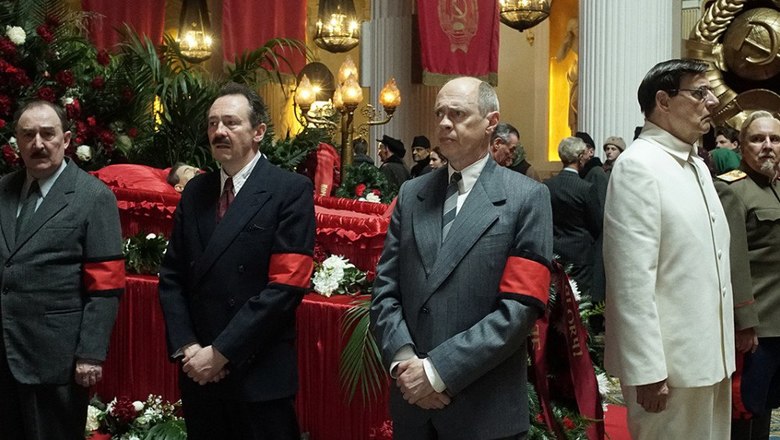Next in Line, by Bob Connally
2 Apr
In March of 1953, the Soviet Union had been gripped by the Great Terror for two decades. With each new enemies list, Premier Joseph Stalin had more Soviet citizens exiled, arrested, or executed without trial. With even the most conservative estimates suggesting that Stalin was responsible for the deaths of 20 million people, there’s a sense that the opening sequence of Armando Iannucci’s new satire is not as outlandish as it may seem.
Fearing for his life when Stalin personally calls asking for a recording of that evening’s Mozart recital, Andreyev (Paddy Considine, Hot Fuzz) frantically implores the orchestra and as many of the attendees as he possibly can to return to their seats to play it again. He even orders that people be brought in from off the street so that the acoustics will be right. Meanwhile, out in those streets the NKVD are arresting or murdering the members of Stalin’s newest list.
Stalin (Adrian McLoughlin) for his part is spending the evening drinking and watching an American western with his closest associates, Lavrentiy Beria (Simon Russell Beale), Georgy Malenkov (Jeffrey Tambor), Vyacheslav Molotov (Michael Palin), and Nikita Khrushchev (Steve Buscemi). As they say goodnight Beria informs Malenkov and Khrushchev that Molotov’s name is on a list, reminding them that being in Stalin’s inner circle is no protection. Unbeknownst to anyone though is that this night would change the course of history as Stalin would suffer a cerebral hemorrhage from which he would not recover. As one era ends, the next will be determined by the power plays made by the last men to see Stalin alive.
Dubbed, “the hardman of political satire” by The Daily Telegraph, Armando Iannucci is best known as the mind behind In the Loop and Veep. Basing the film upon the French graphic novel, La mort de Staline, Iannucci puts his distinct stamp on The Death of Stalin. Boasting the same kind of deeply biting comedy as his other work, Iannucci portrays these real life historical figures as men who weave between being brilliant schemers and inept buffoons from one moment to the next. What remains consistent for each of them throughout it all is the sense of desperation. The race to become the new leader of the Soviet Union has as much to do with survival as it has to do with the desire for power. No one wants to end up on the enemies list of Lavrentiy Beria.
As this is a satire, Iannucci doesn’t worry about adhering to the letter of historical law, preferring to highlight the absurdity of the situation and the Communist Party leaders. It’s an approach that can in some respects reveal more truth than a straight dramatic presentation could. The line between comedy and historical fact blurs at times during The Death of Stalin as well. The morning that Stalin is discovered laying on the floor, barely clinging to life, none of the other party leaders feel comfortable immediately calling a doctor, feeling that any decision must be made by committee.
As always, Iannucci’s casting choices prove impeccable. Wisely, he doesn’t ask his primarily British and American cast to worry about performing with Russian accents, opting instead to just let Steve Buscemi sound like Steve Buscemi. This fits well with the approach of the film. As Khrushchev, Buscemi essentially ends up stepping out as the lead in this ensemble cast. His Khrushchev is not as overtly ruthless as Beale’s Beria. More shrewd and levelheaded than the others, Khrushchev plays his thoughts and true intentions closer to the vest.
Other highlights in the cast include Jason Isaacs as Field Marshall Zhukov and Andrea Riseborough and Rupert Friend as Stalin’s adult children, both of whom are unsure of their futures with their father gone.
The greatest joy of The Death of Stalin however comes from seeing Michael Palin (my favorite member of Monty Python) making a rare film appearance. Doing more than simply showing up, Palin is pure gold as the endlessly loyal Molotov. Even after learning Stalin had ordered him killed- an order rescinded by the dictator’s sudden death- Molotov remains devoted to the man and all for which he stood. Palin even deftly carries the film’s single funniest scene on his shoulders, proving that not only has he not lost a step, he may have even picked up a couple.
The Death of Stalin will please fans of Iannucci and anyone who enjoys the art of well executed satire, a rarity in movies.




No comments yet